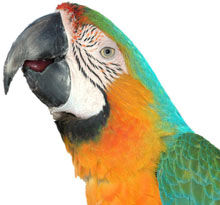 SEED-BASED DIETS
SEED-BASED DIETS
When asked to think of a typical bird diet most people’s minds jump straight to a seed mix but in reality an all seed diet is like an all McDonald’s diet for people. On its own seeds contain primarily carbohydrates and fats and is lacking in protein, vitamins and minerals. Although seed diets can be supplemented with other foods such as fruits and vegetables most birds will still selectively eat a higher proportion of seed. A diet high in carbohydrates and fats leads to obesity, liver problems and lowered resistance to disease.
PELLET DIETS
Pelleted diets have been specially formulated to meet the nutritional demands of birds and prevent the birds from being able select out their favorite parts of the diet. We recommend Vetafarm and Harrison’s pellets.
Converting to a Pellet Diet
Just like a child who is use to a diet of pizza, mars bars and McDonald’s it can be hard to convince your seed-eating bird to change to a healthy diet. It can take time and patience but will leave your birds happier and healthier.
Conversion
- Add pellets to a clean bowl and place in your bird’s favorite feeding area.
- Leave them there all day with another bowl of fruit/veges and have water available at all times.
- Check the amount that has been eaten that evening, if it seems insufficient offer your bird its original diet in a separate bowl for 30 minutes only. After this time leave just the pellets and fruit/veges in the cage.
- The bird should never be starved or forced into eating the pellets. It is also best to start conversion when your bird is healthy; if they are sick their normal diet should be offered at all times, as changing them over can cause extra stress.
- Weigh your bird at the same time every day – if they are losing weight you need to slow down their conversion rate. Also monitor their droppings – if the green component (the faeces) is sloppy, dark in colour or small this is a sign your bird isn’t eating enough.
Tricks and tips on conversion
- Pretend to eat the food yourself or offer around your own meal times so birds feel part of the ‘flock’
- Try placing a few pellets on top of a mirror – this will attract birds to eat with their friend!
- Give praise when eating the pellets
- Feed mixed in with small amount of seed
- Add water to pellets and mush seed into them so birds have to taste the pellets when getting seed
- Pellets should make up approximately 60% of your bird’s diet.
LORIKEETS
Lorikeets require a specialised diet. A variety of dry and wet lorikeet mixes are available.. Lorikeets will also enjoy fresh fruit and native plants to chew on.
NUT EATERS
Birds such as Macaws should be a formulated pellet diet with nut supplements. Your pet bird should be supplied with fresh, unflavoured nuts such as macadamias, peanuts and almonds.
FRUIT EATERS
Birds such as Conures, Indian Ring Necks and Eclectus Parrots require a diet of formulated pellets with fruit supplements. See the list below for healthy fruit options.
SEED EATERS
Birds such as the Budgerigar, Cockatoo, Galah and Cockatiel are traditionally seed-eating birds. As we now know a pure seed diet is unhealthy and should be replaced with a 60% formulated pellet diet. This can then be supplemented with small amounts of seed mix, fruit and vegetables.
SAFE FOODS
Safe Fruit
|
Safe Vegetables
|
Table Food
It is a nice bonding experience to share our food with our parrot, but we must remember that not all human food is safe for birds. A small amount of cooked rice, pasta, potato, eggs or toast can be offered to your bird as a treat.
Native plants
Native plants such as eucalyptus, grevillea, acacia and melaleuca trees can be given to your pet bird to play on and eat! These branches should be cut off, washed and then left in the sun to dry before being put in with your birds. Make sure there are no signs of mould, fungus or parasites on the branches.
Toxic foods that should NEVER be fed to your bird
- Chocolate
- Dairy products
- Coffee
- Avocado
- Onion
- Garlic
- Rhubarb
- Raw potato
- Drugs or alcohol
